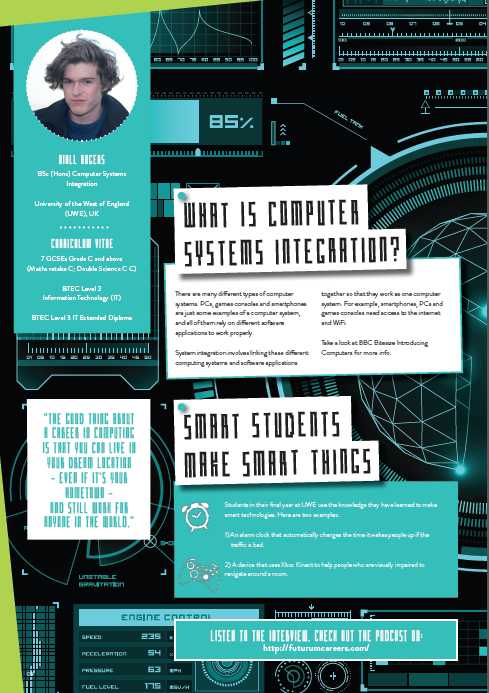
Niall Rogers, BSc (Hons) Computer Systems Integration
University of the West of England (UWE), UK
Curriculum Vitae
7 GCSEs Grade C and above (Maths retake C; Double Science C C)
BTEC Level 2 Information Technology (IT)
BTEC Level 3 IT Extended Diploma
Niall at work on his computer
Computer systems integration
Niall Rogers: licence to code
Is this the next Q from James Bond?
Is this the next Q from James Bond?
Niall didn’t think he was particularly good at ICT, and he wasn’t keen on going to university. Now in his second year at the University of the West of England, we ask him how he ended up studying Computer Systems Integration
When you were in Year 9 at school, you decided to take the BTEC in Information Technology. Why didn’t you take Computer Science GCSE?
At the Year 9 parents’ evening, my IT teacher told me I should do IT GCSE because the grades I’d achieved throughout the year were really good, but the GCSE comes with an exam. I didn’t want to take the exam because I’m not very good at them. I liked the idea of doing the coursework while learning IT at the same time.
That one parents’ evening has led you to studying computer science at college and university. Were you interested in IT at the time?
I had an interest – like everyone does at that age – in video games, consoles, stuff like that, but I didn’t own a computer or laptop until Year 10.
You ended up with a merit. How difficult did you find the BTEC course?
It wasn’t that difficult. I was a bit shocked with the merit result because it involved a lot of writing, which was kinda boring – and there wasn’t any programming. The GCSE might have been better for me, but this course hasn’t stopped me from getting where I am today, so I don’t regret it.
What subjects did you take at college?
I retook English Language and did the Level 3 IT Extended Diploma. For the Diploma, I came out with triple distinction star, which filled me with a lot of confidence.
LEAVING HOME
Why did you choose to go to university?
I wasn’t going to go to university. The college workload was pretty heavy, so I wanted to take a break. I knew university was going to be expensive; it meant moving away; and I didn’t feel quite ready for it. But mum was having none of that.
My tutor at college said: ‘You might as well strike while the iron’s hot. If you’ve got the motivation for it you should try and go for it.’ It was a bit after the UCAS deadline when we [Niall and his tutor] started scouting around for degree courses that were actually going to push me – because the ones I’d taken previously hadn’t. When we got in contact with Martin, the course leader at UWE, he was keen to take on more people, so I decided to go for it. It seemed like the right choice.
Niall at work on his computer
Computer systems integration
Niall Rogers: licence to code
When you were in Year 9 at school, you decided to take the BTEC in Information Technology. Why didn’t you take Computer Science GCSE?
At the Year 9 parents’ evening, my IT teacher told me I should do IT GCSE because the grades I’d achieved throughout the year were really good, but the GCSE comes with an exam. I didn’t want to take the exam because I’m not very good at them. I liked the idea of doing the coursework while learning IT at the same time.
That one parents’ evening has led you to studying computer science at college and university. Were you interested in IT at the time?
I had an interest – like everyone does at that age – in video games, consoles, stuff like that, but I didn’t own a computer or laptop until Year 10.
You ended up with a merit. How difficult did you find the BTEC course?
It wasn’t that difficult. I was a bit shocked with the merit result because it involved a lot of writing, which was kinda boring – and there wasn’t any programming. The GCSE might have been better for me, but this course hasn’t stopped me from getting where I am today, so I don’t regret it.
What subjects did you take at college?
I retook English Language and did the Level 3 IT Extended Diploma. For the Diploma, I came out with triple distinction star, which filled me with a lot of confidence.
LEAVING HOME
Why did you choose to go to university?
I wasn’t going to go to university. The college workload was pretty heavy, so I wanted to take a break. I knew university was going to be expensive; it meant moving away; and I didn’t feel quite ready for it. But mum was having none of that.
My tutor at college said: ‘You might as well strike while the iron’s hot. If you’ve got the motivation for it you should try and go for it.’ It was a bit after the UCAS deadline when we [Niall and his tutor] started scouting around for degree courses that were actually going to push me – because the ones I’d taken previously hadn’t. When we got in contact with Martin, the course leader at UWE, he was keen to take on more people, so I decided to go for it. It seemed like the right choice.
What do you like most about the course?
I like how it’s not just focused on one area. Some days you’ll be working on web design, and on other days you’re programming a robot to follow a line. I went to uni with very little programming experience and now I’m basically learning entire new computer programming languages – not just one but five or six.
Is there anything you don’t like?
In the first year, they give you information brick by brick, and build on it, Now, in the second year, they’re not giving us bricks, they’re giving us walls and houses to put up. I suppose I should be taking more notes. I guess that’s what more committed students do.
LIFE AFTER UNI
Do you have to be a certain type of person to study this course?
No, as long as you’re dedicated and happy with it, you can be any type of person. You can be the laziest person in the world, and sit in your bed, and you’ll still make something good out of it.
What do you want to do when you leave university?
I want to do something I’m going to enjoy. Something that pays OK so I’m not scraping around for the rent each month. If MI5 or GCHQ have departments that need computer security, or embedded systems, that’s something I’d like to look into in the future. My dad is really passionate about that. He said I could be the next Q in James Bond.
Are you saying the world is your oyster?
That’s the picture that has been painted for us at uni – that there aren’t really many limitations. I think the tutor said that 98 per cent of students he had last year were employed as soon as they left university because of their placement year [in the third year, students can choose to work in a company]. The good thing about a career in computing is that you can live in your dream location and still work for anyone in the world.
What is computer systems integration?
There are many different types of computer systems. PCs, games consoles and smartphones are just some examples of a computer system, and all of them rely on software applications to work properly.
System integration involves linking these different computing systems and applications together so that they work as one computer system. For example, smartphones, PCs and games consoles need access to the internet and WiFi.
Take a look at BBC Bitesize Introducing Computers for more info.
Smart students make smart things
Students in their final year at UWE use the knowledge they have learned to make smart technologies. Here are two examples:
 1) An alarm clock that automatically changes the time it wakes people up if the traffic is bad
1) An alarm clock that automatically changes the time it wakes people up if the traffic is bad
 2) A device that uses Xbox Kinect to help people who are visually impaired to navigate around a room
2) A device that uses Xbox Kinect to help people who are visually impaired to navigate around a room




